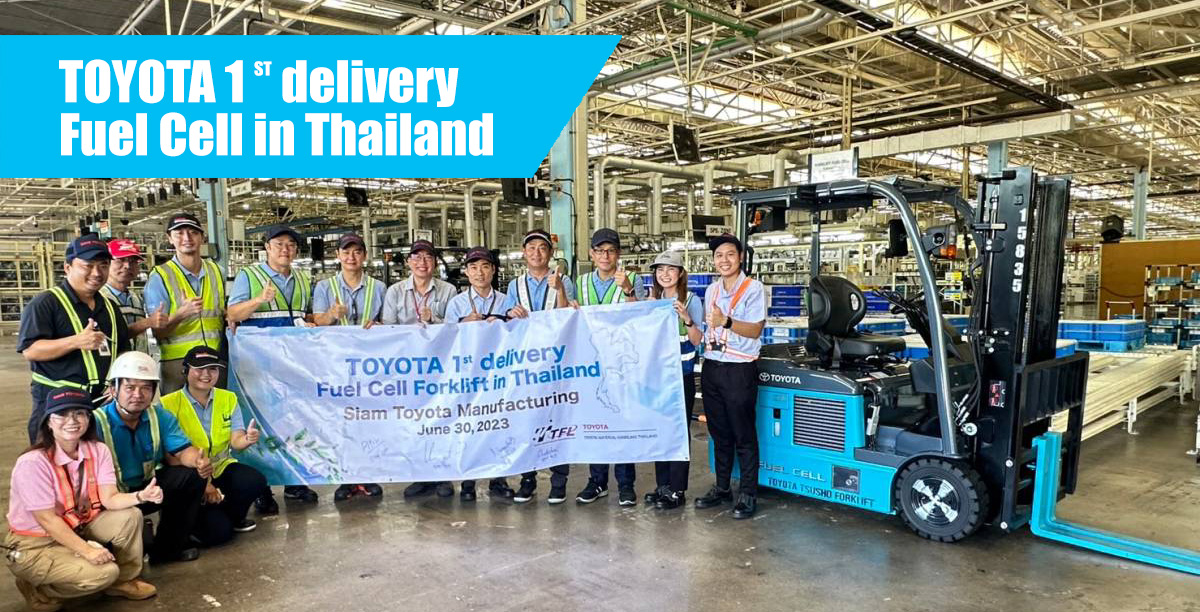
Management and staffs of Siam Toyota Manufacturing, Toyota Material Handling (Thailand) Co., Ltd. and Toyota Tsusho Forklift (Thailand) Co., Ltd. takes pictures together; Mr. Virayot Prutakorawong – Managing Director of Siam Toyota Manufacturing Co., Ltd. (Middle), Mr. Shigeru Matsumoto – Managing Director of Toyota Material Handling (Thailand) Co., Ltd. (First right from the middle), and Mr. Hiroshi Mukai – President of Toyota Tsusho Forklift (Thailand) Co., Ltd. (Second left from the middle) and staffs of all three companies for a celebrating moment of the first Fucel Cell Forklift delivery in Thailand.
Recently, environmental measures and issues such as SDGs and carbon neutrality (CN) are being called out all over the world, especially efforts to realize carbon neutrality, are becoming attention in Thailand. Siam Toyota Manufacturing recognizes the importance of reducing emissions, or zero emissions, by using non-polluting hydrogen-powered Fuel Cell forklifts.
Toyota Tsusho Forklift (Thailand) and Toyota Material Handling (Thailand) proudly promote the fuel cell forklift in Thailand. We strongly contribute to the zero CO2 emissions society, and also we can help your carbon neutral activities towards the realization of the coming hydrogen society.
In terms of material handling equipment, this is not our start point because Toyota Industries, a forklift manufacturer, has been making environmentally friendly efforts such as producing and selling electric forklifts for almost 60 years. To have an even better contribution to solve such carbon issues, we realized we could make a greater move to reach carbon neutrality and SDGs by developing fuel cell forklifts and be a major part to drive a green society, a better world.
We have been developing Electric forklifts since 1964. The current model is 8 series which is first produced and developed in 2016. We have developed the fuel cell forklift model the same as 8 series. We started selling fuel cell forklifts in Japan from 2016 and sold more than 350 units to pursue a free CO2 society for the industries.
Fuel cell forklifts do not generate CO2 comparing to Gasoline, Diesel and Electric forklift.
Flow of fuel cell
- TOYOTA forklift use the same fuel cell stack as Mirai passenger car.
- Fuel cell unit for fuel cell forklift is different because it is developed by technology of Toyota Industries Corporation specialized for forklift material handling purpose.
- The energy for fuel cell forklift is Hydrogen which is filled into tank of approximately 1.2 kg at maximum pressure 35 Mpa.
- A fuel cell is a device that generates electricity through a chemical reaction that combines hydrogen and oxygen from air compressor to produce electricity.
- During this chemical reaction, electrical energy is released to storage device.
This energy supplies to - Drive motor for backward-forward
- Pump motor for lifting and tilting
- In emergency situations, the fuel cell forklifts can be a power supply of AC 100V for 1kW x 15hours such as lights in a warehouse.
Detail of Fuel Cell System
- For Fuel cell forklifts, Hydrogen generates electricity, then trucks utilize electricity for operations.
- Fuel cell is similar to a generator. Unlike storage batteries (such as a lead battery for electric vehicle), electricity is continuously generated by supplying hydrogen as fuel without recharging.
- Engine is a device that uses chemical energy a fuel to produce mechanical energy. Engines operating on this principle are called internal combustion engines and are used in an internal combustion forklift.